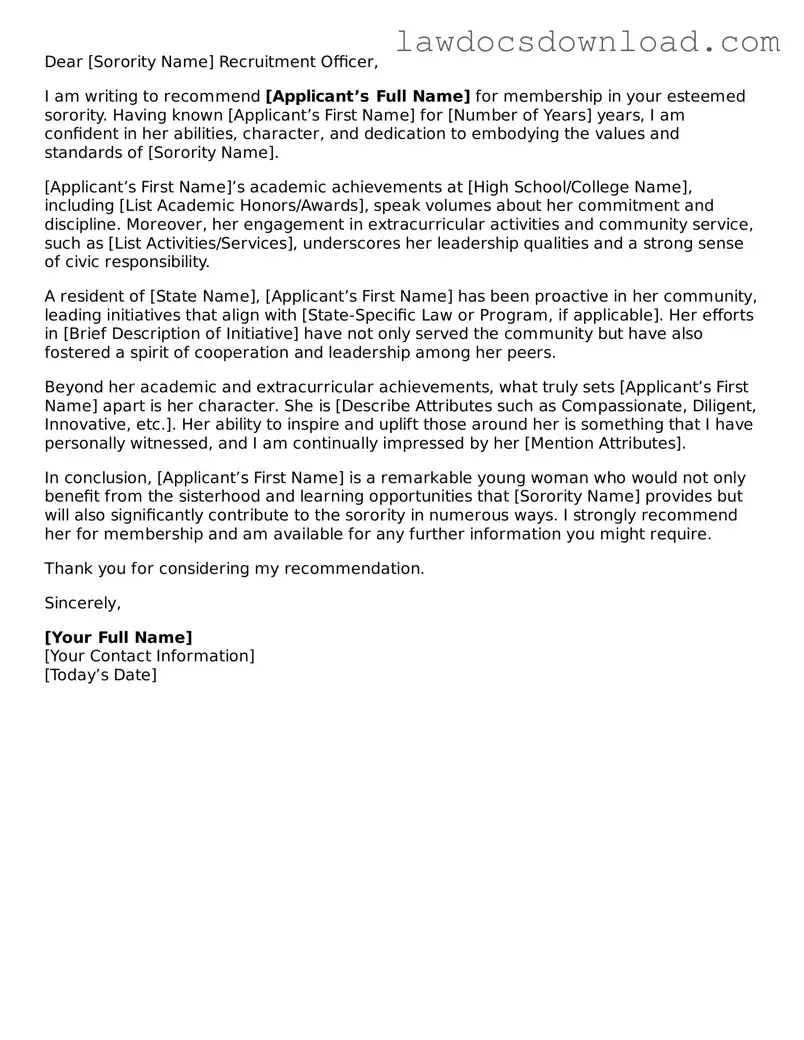A sorority recommendation letter form is similar to a college recommendation letter. Both documents aim to endorse an individual, highlighting their qualifications and character traits, to secure a position within a community - in the former's case, a sorority, and in the latter, an academic institution. Both encompass personal anecdotes and examples that showcase the applicant's abilities and personality, making a compelling case for their admission.
It also bears resemblance to a professional reference letter, often required when applying for a job. Like a sorority recommendation letter, this document attests to an individual's skills, work ethic, and other professional attributes. The key difference lies in the focus on employment-related qualities and competencies in a professional reference letter, whereas a sorority recommendation might emphasize character and social engagement more closely.
The concept is akin to a scholarship application letter, where individuals seek financial support for their studies. Though the primary goal differs - one seeks membership in a sorority and the other financial aid - both documents necessitate a persuasive presentation of the applicant's merits and potential contributions to the respective communities. Scholarship letters, like sorority recommendations, often require detailed accounts of the applicant's achievements and aspirations.
Similarly, an internship application letter parallels the sorority recommendation letter in its function to advocate for the applicant's selection for a position, in this case, an internship. Both highlight the candidate's relevant experiences, skills, and the value they would bring to the organization or group. However, an internship application places a greater emphasis on professional development and career objectives.
A character reference letter, intended for various formal situations such as court hearings, is another document that shares common ground with a sorority recommendation letter. Both serve to vouch for an individual's moral standing and personal virtues, often including anecdotal evidence to support claims about the subject's character. The main distinction typically lies in the context of use and the specific qualities each letter seeks to underscore.
A visa application support letter, though seemingly distinct, shares the objective of endorsing an individual for a specific cause - in this analogy, the cause is obtaining permission to enter a different country. Like a sorority recommendation letter, it accentuates the applicant's intentions and reliability, but with a focus on their purposes for travel and assurance against visa violations.
Comparable to a mentorship program application letter, the sorority recommendation letter facilitates someone's acceptance into a beneficial relationship or group. Both types of applications necessitate showcasing the candidate's suitability for the opportunity, their eagerness to learn and grow, and how they might contribute to or benefit from the relationship. Mentorship applications, specifically, focus on professional and personal development goals.
A club membership application letter is closely related, as it also seeks to gain the applicant admittance into an exclusive group. Each form of application must present the candidate in a favorable light, demonstrating their compatibility with the club's ethos and their potential to enrich the club's community. The emphasis here, as with sorority recommendations, is on social compatibility and the contribution to collective experiences.
An adoption reference letter, although used in a much more personal and profound context, shares the essence of advocating for an individual's character and capacity to undertake certain responsibilities - in this instance, parenting. This document, like a sorority recommendation letter, sets forth arguments based on personal knowledge of the individual, aiming to support a life-changing decision. Here, the primary focus is on the suitability for parenting rather than community involvement.

